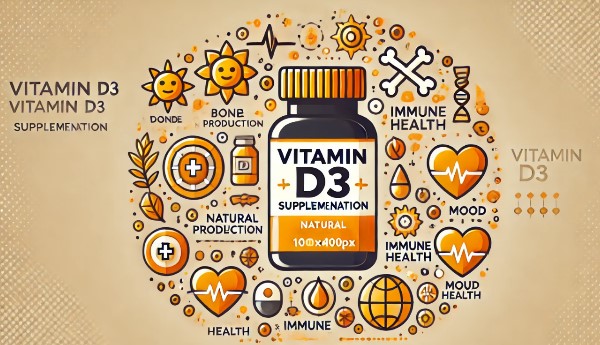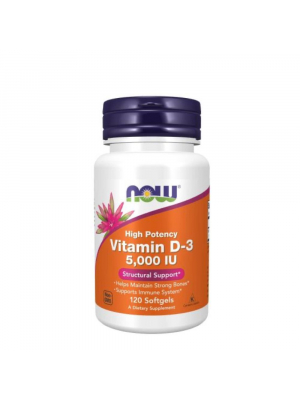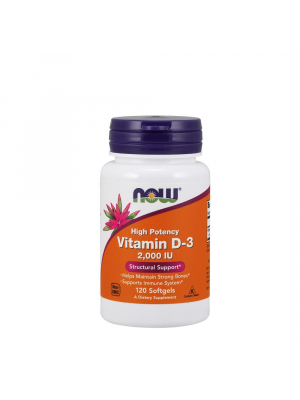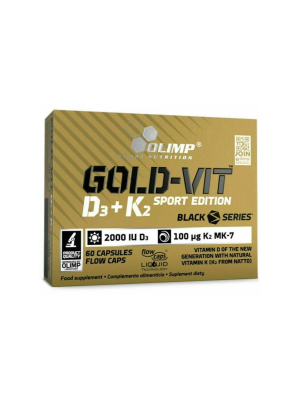5% OFF FIRST ORDER WITH CODE FRST5 AT CHECKOUT!
The Complete Guide to Vitamin D3 Supplementation: Benefits, Dosage, and Risks

The Ultimate Guide to Vitamin D3 Supplementation: Benefits, Dosage, and Risks
Vitamin D3 has gained significant attention over the past decade, and for good reason. Often referred to as the "sunshine vitamin," Vitamin D3 (cholecalciferol) plays an essential role in maintaining bone health, boosting immunity, and promoting overall well-being. However, many individuals are deficient in this vital nutrient, leading to a rise in Vitamin D3 supplementation. Whether you're considering supplementation or already taking Vitamin D3, understanding its benefits, proper dosage, and potential risks is crucial for making informed health decisions.
In this comprehensive guide, we'll dive deep into everything you need to know about Vitamin D3 supplementation, including:
- What is Vitamin D3?
- Why is Vitamin D3 important for health?
- Benefits of Vitamin D3 supplementation
- Who is at risk of Vitamin D deficiency?
- Optimal dosages for Vitamin D3 supplementation
- Vitamin D3 toxicity and risks of over-supplementation
- How to choose the right Vitamin D3 supplement
- Frequently asked questions (FAQs) about Vitamin D3
1. What is Vitamin D3?
Vitamin D3, also known as cholecalciferol, is one of two main forms of Vitamin D. The other form, Vitamin D2 (ergocalciferol), is typically found in plant-based foods. Vitamin D3 is naturally synthesized by the skin when exposed to sunlight and is considered the more potent and effective form of Vitamin D for raising levels in the blood.
Vitamin D3 is classified as a fat-soluble vitamin, meaning it is absorbed along with fats in the diet and stored in the body's fat tissue. Although it's often referred to as a vitamin, Vitamin D is technically a hormone. Once absorbed or produced in the skin, it undergoes a conversion process in the liver and kidneys to its active form, calcitriol, which regulates calcium and phosphate levels in the body.
Why Vitamin D3 Instead of D2?
Research suggests that Vitamin D3 is more effective than Vitamin D2 in raising and maintaining blood levels of calcidiol (25-hydroxyvitamin D), the major circulating form of Vitamin D used to assess Vitamin D status. Therefore, Vitamin D3 is often preferred for supplementation due to its higher efficacy and longer-lasting effects.
2. Why is Vitamin D3 Important for Health?
Vitamin D3 plays a critical role in various bodily functions, primarily related to bone and immune health. It facilitates the absorption of calcium and phosphorus, two essential minerals for maintaining healthy bones and teeth. Without sufficient Vitamin D3, calcium absorption becomes inefficient, leading to potential bone disorders such as osteomalacia in adults and rickets in children.
Beyond bone health, Vitamin D3 has a wide range of functions:
-
Immune Function: Vitamin D3 helps regulate the immune system by enhancing the pathogen-fighting effects of white blood cells and reducing inflammation. Studies suggest that adequate Vitamin D3 levels may protect against respiratory infections, including the flu and COVID-19.
-
Mood and Mental Health: Research indicates a link between Vitamin D3 and mental well-being. Low levels of Vitamin D have been associated with an increased risk of depression, anxiety, and seasonal affective disorder (SAD).
-
Cardiovascular Health: Some studies suggest that Vitamin D3 may help lower the risk of cardiovascular disease by improving heart function and reducing arterial stiffness.
-
Blood Sugar Regulation: Emerging research shows that Vitamin D3 may improve insulin sensitivity and support glucose metabolism, potentially lowering the risk of Type 2 diabetes.
-
Anti-inflammatory Effects: Vitamin D3 has been shown to have anti-inflammatory properties, which can be beneficial in preventing or managing chronic diseases related to inflammation.
3. Benefits of Vitamin D3 Supplementation
If you're not getting enough Vitamin D3 from sunlight or diet, supplementation may provide numerous health benefits:
3.1. Improved Bone Health
One of the primary reasons for taking Vitamin D3 is to enhance calcium absorption and promote strong bones. This is especially important for individuals at risk of osteoporosis, such as postmenopausal women and the elderly. Adequate Vitamin D3 intake helps reduce the risk of bone fractures and osteoporosis-related complications.
3.2. Enhanced Immune Function
Vitamin D3 strengthens the immune system, making it more effective in fighting off infections. Several studies have found that individuals with low Vitamin D levels are more susceptible to infections like the common cold, flu, and respiratory tract infections. Supplementing with Vitamin D3 can help reduce the incidence and severity of these illnesses.
3.3. Mental Health and Mood Regulation
Vitamin D3 has been linked to improved mood and reduced symptoms of depression. People with Vitamin D deficiency may experience fatigue, mood swings, or depression, particularly during the winter months when sun exposure is limited. Some clinical trials have found that Vitamin D supplementation can improve symptoms of depression, particularly in those with severe Vitamin D deficiency.
3.4. Cardiovascular Protection
Research indicates that maintaining optimal Vitamin D levels may support heart health. Studies suggest that Vitamin D3 helps regulate blood pressure, improve endothelial function (the lining of blood vessels), and reduce inflammation, which may lower the risk of hypertension and other cardiovascular issues.
3.5. Support for Diabetes and Blood Sugar Regulation
Vitamin D3 may play a role in improving insulin sensitivity, which can be helpful in managing or preventing Type 2 diabetes. Some studies have found that people with low Vitamin D levels have a higher risk of developing diabetes. Although more research is needed, Vitamin D3 supplementation shows potential as an adjunct therapy for improving blood sugar control.
3.6. Anti-Inflammatory Benefits
Chronic inflammation is a root cause of many diseases, including autoimmune disorders, cancer, and cardiovascular disease. Vitamin D3's anti-inflammatory properties can help reduce chronic inflammation and may improve symptoms of autoimmune diseases such as rheumatoid arthritis and multiple sclerosis.
4. Who is at Risk of Vitamin D Deficiency?
Vitamin D deficiency is more common than many realize. Globally, an estimated 1 billion people have insufficient Vitamin D levels, making deficiency a significant public health concern. Certain groups of people are at higher risk of Vitamin D deficiency due to factors like geography, lifestyle, and health conditions.
4.1. Limited Sun Exposure
People living in northern latitudes or areas with limited sunlight during the winter months are more likely to be Vitamin D deficient. Additionally, those who spend most of their time indoors or wear clothing that covers most of their skin may not produce enough Vitamin D3 through sun exposure.
4.2. Darker Skin Tone
Individuals with darker skin tones produce less Vitamin D3 in response to sunlight because melanin, the pigment responsible for darker skin, acts as a natural sunscreen. As a result, people with dark skin may require more sun exposure or higher Vitamin D3 supplementation to achieve optimal levels.
4.3. Older Adults
As people age, their skin becomes less efficient at producing Vitamin D3. Older adults, particularly those over 65, are at increased risk of Vitamin D deficiency, which contributes to bone density loss and increased fracture risk.
4.4. Obesity
Vitamin D3 is fat-soluble, meaning it gets stored in fat tissue. People with obesity may have lower circulating levels of Vitamin D3 because it becomes sequestered in fat cells, reducing its availability in the bloodstream.
4.5. Malabsorption Disorders
Individuals with gastrointestinal conditions such as celiac disease, Crohn’s disease, or cystic fibrosis may have difficulty absorbing Vitamin D3 from food or supplements. This can lead to chronic Vitamin D deficiency and associated health issues.
5. Optimal Dosages for Vitamin D3 Supplementation
Determining the right dosage of Vitamin D3 can be challenging, as individual needs vary based on factors like age, health status, geographic location, and lifestyle. The Recommended Dietary Allowance (RDA) for Vitamin D set by the Institute of Medicine varies by age and gender, but these guidelines serve as a general starting point.
5.1. Recommended Daily Intake
- Infants (0-12 months): 400 IU (10 mcg)
- Children (1-18 years): 600 IU (15 mcg)
- Adults (19-70 years): 600 IU (15 mcg)
- Adults over 70 years: 800 IU (20 mcg)
- Pregnant and breastfeeding women: 600 IU (15 mcg)
5.2. Testing and Personalized Dosages
To determine your specific Vitamin D needs, a blood test measuring 25-hydroxyvitamin D levels (calcidiol) can be helpful. The optimal range for Vitamin D levels in the blood is typically between 30 and 60 ng/mL. Based on your test results, a healthcare provider may recommend a higher or lower dosage of Vitamin D3.
For individuals with severe deficiency, higher doses (such as 1,000 to 5,000 IU per day) may be necessary for several weeks or months to restore optimal levels. It's important to follow your healthcare provider’s recommendations when taking high doses of Vitamin D3.
6. Vitamin D3 Toxicity and Risks of Over-Supplementation
While Vitamin D3 supplementation is generally safe and well-tolerated, it’s possible to take too much, leading to toxicity. Vitamin D3 toxicity occurs when blood levels exceed 100 ng/mL, resulting in a condition called hypercalcemia (excessive calcium levels in the blood).
Symptoms of Vitamin D Toxicity
- Nausea and vomiting
- Weakness and fatigue
- Confusion or disorientation
- Loss of appetite
- Excessive thirst and frequent urination
- Kidney stones or kidney damage
It’s important to note that Vitamin D toxicity is rare and typically occurs only when individuals take extremely high doses (50,000 IU or more) for prolonged periods. To avoid toxicity, it's essential to follow dosage guidelines and regularly monitor blood levels if you’re taking high doses.
7. How to Choose the Right Vitamin D3 Supplement
When selecting a Vitamin D3 supplement, several factors come into play, including quality, dosage, and additional ingredients. Here are some tips for choosing a high-quality supplement:
7.1. Look for D3 (Cholecalciferol)
Ensure that the supplement contains Vitamin D3 (cholecalciferol), which is more effective at raising blood levels compared to Vitamin D2 (ergocalciferol).
7.2. Choose Reputable Brands
Select a trusted brand with third-party testing to ensure quality and potency. Look for certifications such as USP (United States Pharmacopeia) or NSF (National Sanitation Foundation).
7.3. Check for Added Ingredients
Some Vitamin D3 supplements contain added ingredients such as magnesium or Vitamin K2, which can enhance Vitamin D absorption and utilization. However, avoid supplements with unnecessary fillers, artificial colors, or preservatives.
7.4. Liquid vs. Capsule Forms
Vitamin D3 is available in various forms, including capsules, tablets, and liquids. Liquid Vitamin D3 may be more easily absorbed, particularly for individuals with gastrointestinal issues, but capsules and tablets are more convenient for many people.
8. Frequently Asked Questions (FAQs) About Vitamin D3
Q: Can I get enough Vitamin D3 from food?
A: While some foods contain small amounts of Vitamin D3 (such as fatty fish, egg yolks, and fortified dairy), it is challenging to meet daily requirements through diet alone. Sun exposure and supplementation are typically needed to maintain optimal levels.
Q: How much sun exposure is needed to produce adequate Vitamin D3?
A: Sun exposure varies depending on factors like skin type, geographic location, and time of year. As a general guideline, 10-30 minutes of midday sun exposure several times a week can produce sufficient Vitamin D3 for most people. However, sunscreen use and clothing may reduce production.
Q: Should I take Vitamin D3 with food?
A: Yes, since Vitamin D3 is fat-soluble, it’s best absorbed when taken with a meal containing fat. Taking it on an empty stomach may reduce absorption.
Q: Can Vitamin D3 supplements interact with medications?
A: Vitamin D3 can interact with certain medications, including corticosteroids, anticonvulsants, and cholesterol-lowering drugs. Consult with a healthcare provider before starting supplementation if you’re on any medications.
Conclusion
Vitamin D3 supplementation offers numerous health benefits, from strengthening bones to enhancing immune function and supporting mental well-being. While sunlight remains the most natural source of Vitamin D3, supplementation is often necessary to maintain optimal levels, particularly for those at risk of deficiency.
To maximize the benefits of Vitamin D3 supplementation, it's essential to understand your individual needs, monitor blood levels, and choose a high-quality supplement. With proper guidance and dosage, Vitamin D3 can be a powerful tool for promoting long-term health and vitality.

 Polish
Polish































Comments